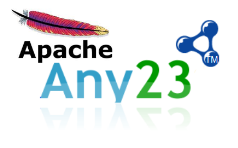Apache Anything To Triples (Any23) is a library and web service that extracts structured data in RDF format from a variety of Web documents. Any23 documentation can be found on the website
For details on the command line tool and web interface, see here
For a guide to using Any23 as a library in your Java applications, see here
Javadocs is available here
You can reach our and connect with our community on our mailing lists
The canonical Any23 source code lives at https://github.com/apache/any23.git
Be sure to have the Apache Maven v.3.x+ installed and included in $PATH.
git clone https://github.com/apache/any23.git
cd any23
mvn clean install
From now on the above directory any23 is refered to as $ANY23_HOME This will install the Any23 artifacts and its dependencies in your local Maven3 repository. You can then extract the compiled code and use the command line interface Please note you will need to change the version to the tar or zip you are extracting.
tar -zxvf $ANY23_HOME/cli/target/apache-any23-cli-${version-SNAPSHOT}.tar.gz
Any23 comes with some command line tools. Within the directory you just extracted, you can invoke: Linux
$ANY23_HOME/cli/target/apache-any23-cli-${version-SNAPSHOT}/bin/any23
# Provides the main Any23 use case: metadata extraction on a file or URL source.
Windows
$ANY23_HOME/cli/target/apache-any23-cli-${version-SNAPSHOT}/bin/any23.bat
# Provides the main Any23 use case: metadata extraction on a file or URL source.
The complete documentation about these tools can be found here
The bin scripts are generated dynamically during the package phase. To ensure the package generation, from the top level directory run:
mvn package
You can void extracting the archive files by going to the cli generated bin folder
cd $ANY23_HOME/cli/target/appassembler/bin/
and finally invoke the script for your OS (UNIX or Windows):
bin$ ./any23
usage instructions will be printed out.
Any23 can be run as a service. To run the Any23 service go to the service dir and then invoke the embedded Jetty server
cd $ANY23_HOME/service
mvn jetty:run
You can check the service is running by accessing http://localhost:8080/ with your browser.
The complete documentation about this service can be found here
The Any23 Service WAR by default will be generated as self-contained, all the dependencies will be included as JAR within the WEB-INF/lib archive dir.
To generate the self contained WAR invoke from the service dir:
service$ mvn [-o] [-Dmaven.test.skip=true] clean package
Where -o will build the process offline, and -Dmaven.test.skip=true will force the test skipping.
The WAR will be generated in
$ANY23_HOME/service/target/any23-service-x.y.z-SNAPSHOT.war
To produce a instead a WAR WITHOUT the included JAR dependencies it is possible to use the war-without-deps profile:
any23-service$ mvn [-o] [-Dmaven.test.skip=true] clean package
The option [-o] will speed up the module build if you have already collected all the required dependencies.
The option [-Dmaven.test.skip=true] will disable tests.
Again the various versions of the WAR will be generated into
$ANY23_HOME/service/target/apache-any23-service-x.y.z-*
The Any23 Web Service form (service/src/main/resources/form.html) contains a Google Analytics Tracker which is
by default configured to report to the Any23 Community. It is possible to change the user ID modifying the
form.tracker.id property in parent POM.
To generate the project site locally execute the following command from $ANY23_HOME:
cd $ANY23_HOME
MAVEN_OPTS='-Xmx1024m' mvn [-o] clean site:site
You can speed up the site generation process specifying the offline option [-o], but it works only if all the involved plugin dependencies has been already downloaded in the local M2 repository.
If you're interested in generating the Javadoc enriched with navigable UML graphs, you can activate the umlgraphdoc profile. This profile relies on graphviz that must be installed in your system.
cd $ANY23_HOME
MAVEN_OPTS='-Xmx1024m' mvn -P umlgraphdoc clean site:site
When it was decided that the Any23 code be brought into the Apache Incubator, the existing code was migrated over to the ASF infrastructure and documented/managed via a number of Jira tickets e.g, INFRA-3978 INFRA-4146 and ANY23-29.




